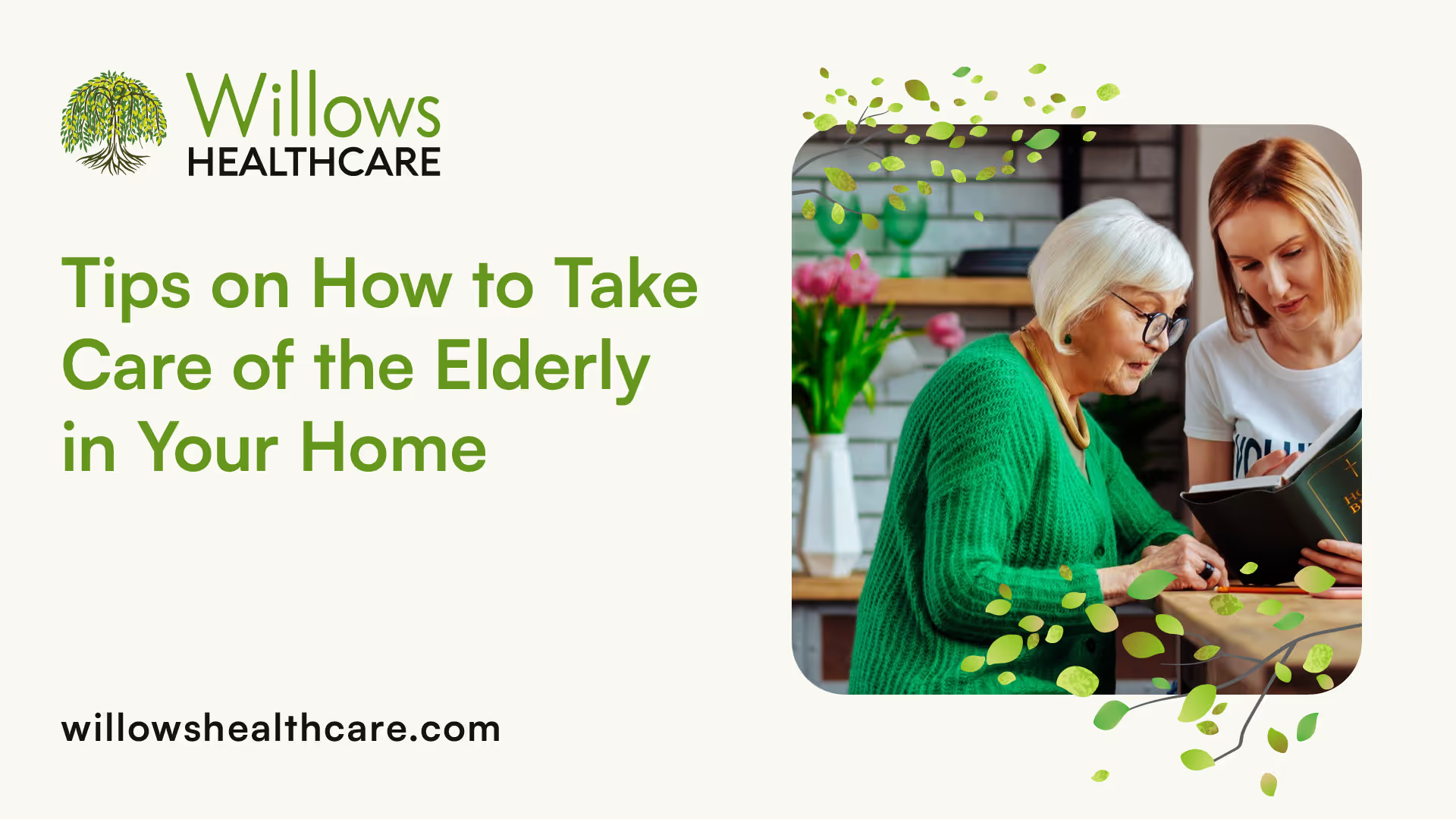Tips on How to Take Care of the Elderly in Your Home
March 5, 2025
Discover vital tips for providing elderly home support with confidence. Elevate care and well-being effortlessly!


Elderly Home Support: A Vital Role
Caring for the elderly in a home setting is a significant responsibility that requires compassion, patience, and dedication. Understanding the importance of providing elderly home care is crucial for ensuring the well-being and quality of life of aging individuals. At the same time, caregivers face various challenges that can impact their ability to provide adequate support.

Understanding the Importance of Elderly Home Care
Elderly home care plays a vital role in enhancing the quality of life for seniors by enabling them to age in a familiar and comfortable environment. It offers personalized and tailored assistance that addresses the unique needs and preferences of each individual. By receiving care at home, seniors can retain their independence and autonomy while receiving the necessary support to navigate daily activities.
Benefits of Elderly Home Care
Enhanced comfort and familiarity
Personalized and individualized care
Retention of independence and autonomy
Support in daily activities within a familiar environment
Challenges Faced by Caregivers
Caregivers providing support to the elderly in a home environment often encounter various challenges that can impact their well-being and effectiveness. From physical demands to emotional stress, navigating the complexities of care can be both rewarding and overwhelming. Understanding and addressing these challenges are essential for caregivers to maintain their own health and provide quality care to their loved ones.
Common Challenges for Caregivers
Physical strain from caregiving tasks
Emotional stress and burnout
Balancing caregiving responsibilities with personal life
Financial constraints related to caregiving expenses
By recognizing the importance of elderly home care and understanding the challenges faced by caregivers, individuals can approach caregiving with knowledge, empathy, and resilience. Providing care with confidence involves not only addressing the needs of the elderly but also prioritizing the well-being of caregivers to ensure sustainable and compassionate support.
Creating a Safe Environment
When it comes to providing elderly home support, creating a safe environment is paramount to ensure the well-being and comfort of elderly individuals. This involves adapting the home to meet their specific needs and implementing accessibility and safety measures to prevent accidents or injuries.

Adapting the Home for Elderly Needs
As individuals age, their physical abilities may change, requiring modifications to the living environment to enhance their comfort and safety. Here are some areas of the home that can be adapted to better accommodate the needs of the elderly:

By making these adjustments, caregivers can create a more functional and comfortable living space for the elderly, reducing the risk of accidents and promoting independence.
Ensuring Accessibility and Safety Measures
In addition to adapting the physical environment, implementing safety measures throughout the home is essential to prevent falls and other accidents. Caregivers can take the following steps to enhance accessibility and safety for elderly individuals:

By implementing these safety measures, caregivers can create a secure environment that promotes the well-being and independence of the elderly residents. Ensuring that the home is both accessible and safe is a crucial step in providing quality care and support for elderly individuals living in a home environment.
Meeting Physical Care Needs
In the realm of elderly home support, meeting the physical care needs of the elderly is paramount to ensuring their well-being and quality of life. This section highlights key aspects related to personal hygiene and grooming, proper nutrition and hydration, as well as managing medications in a home setting.

Personal Hygiene and Grooming
Maintaining good personal hygiene and grooming practices is essential for the elderly to feel comfortable, confident, and healthy. Caregivers should assist with tasks such as bathing, oral care, hair care, and dressing to promote cleanliness and prevent skin issues. Ensuring a regular hygiene routine can also boost self-esteem and overall well-being.
Proper Nutrition and Hydration
Proper nutrition and hydration play a vital role in supporting the physical health of the elderly. Caregivers should strive to provide balanced meals that are rich in essential nutrients such as vitamins, minerals, protein, and fiber. Additionally, staying hydrated is crucial for maintaining optimal bodily functions and preventing dehydration, especially in older adults who may be prone to fluid imbalances.

Managing Medications
As individuals age, the management of medications becomes increasingly important to ensure adherence to prescribed treatment plans and avoid potential complications. Caregivers should organize medication schedules, maintain a list of medications and dosages, and ensure that medications are taken as directed by healthcare providers. It is crucial to monitor for any adverse reactions or side effects and promptly report them to medical professionals.
By addressing the physical care needs of the elderly through proper hygiene practices, nutritious meals, hydration, and medication management, caregivers can contribute significantly to the overall health and well-being of their loved ones in a home environment. Consistent support and attention to these fundamental aspects of care can enhance the quality of life for the elderly and foster a safe and nurturing home environment.
Providing Emotional Support
When taking care of the elderly at home, providing emotional support is just as essential as meeting their physical needs. Emotional well-being plays a significant role in the overall quality of life for seniors. In this section, we will explore vital aspects of emotional support, including active listening and communication, encouraging independence and dignity, and addressing emotional well-being.
Active Listening and Communication
Effective communication is key to fostering a strong bond with the elderly and understanding their emotional needs. Active listening involves giving full attention to the person speaking, showing empathy, and validating their feelings. By actively listening, caregivers can create a safe space for seniors to express their thoughts, concerns, and emotions without judgment.
Active Listening Tips
Maintain eye contact
Use open body language
Repeat or summarize to show understanding
Avoid interrupting
Show empathy and patience
Encouraging Independence and Dignity
Encouraging independence and preserving the dignity of the elderly are vital aspects of emotional support. Seniors may value their independence and autonomy, even when they require assistance with daily tasks. Caregivers can promote independence by involving seniors in decision-making, respecting their choices, and providing opportunities for self-care and decision-making whenever possible.
Ways to Encourage Independence and Dignity
Allow seniors to participate in activities
Respect their preferences and routines
Provide choices whenever feasible
Empower them to make decisions about their care
Offer support without taking over tasks
Addressing Emotional Well-being
Addressing the emotional well-being of the elderly is crucial for their mental health and overall happiness. Seniors may experience a range of emotions, including loneliness, anxiety, and depression, which can impact their well-being. Caregivers can support emotional wellness by creating a positive and nurturing environment, engaging in meaningful conversations, and seeking professional help if needed.
Strategies for Addressing Emotional Well-being
Foster a sense of belonging and companionship
Encourage participation in activities they enjoy
Monitor for signs of depression or anxiety
Provide social interaction and emotional support
Seek guidance from mental health professionals when necessary
By actively engaging in effective communication, promoting independence and dignity, and addressing emotional well-being, caregivers can provide the necessary emotional support to enhance the overall well-being and quality of life for the elderly in their care.
Promoting Social Engagement
When it comes to providing care for the elderly in a home setting, promoting social engagement is vital for their overall well-being. Encouraging social activities, involvement in community programs, and fostering meaningful connections can significantly enhance the quality of life for elderly individuals.
Encouraging Social Activities
Engaging elderly individuals in social activities is essential for combatting feelings of isolation and loneliness. Encourage participation in activities that align with their interests and capabilities, such as:

By including social activities in the daily routine, you can create opportunities for joy, companionship, and mental stimulation for the elderly individual.
Involvement in Community Programs
Community programs offer a valuable opportunity for elderly individuals to engage with others outside the home environment. Consider activities such as:

Encouraging participation in community programs can help combat feelings of isolation and provide a sense of belonging and fulfillment.
Fostering Meaningful Connections
Building and maintaining meaningful connections is crucial for the emotional well-being of elderly individuals. As a caregiver, you can support the elderly in fostering connections by:
- Facilitating regular communication with friends and family members through phone calls, video chats, or visits.
- Organizing social gatherings or outings with loved ones to create memorable experiences.
- Encouraging involvement in support groups or social clubs where they can interact with peers facing similar challenges.
By fostering meaningful connections, you can help the elderly feel valued, supported, and connected to their community, enhancing their overall quality of life.
Self-Care for Caregivers
Taking care of the elderly in a home setting is a rewarding yet demanding responsibility. Caregivers play a pivotal role in ensuring the well-being and comfort of their loved ones. However, it is crucial for caregivers to prioritize their own self-care to prevent burnout and provide effective support. Here are essential tips for caregivers to maintain their well-being while caring for the elderly at home.
Setting Realistic Expectations
Caregivers often put immense pressure on themselves to meet every need and expectation, which can lead to feelings of overwhelm and exhaustion. Setting realistic expectations is key to managing caregiver stress. It is essential to understand that it is okay to seek help and that no one can do everything on their own. Establishing achievable goals and boundaries can help prevent caregiver fatigue and promote a healthier caregiving experience.
Seeking Support and Resources
Caregiving can be emotionally and physically draining, and it is essential for caregivers to seek support and resources to navigate the challenges that come with caring for the elderly. Connecting with support groups, counseling services, or respite care can provide caregivers with the necessary tools and assistance to manage their caregiving responsibilities effectively. Engaging with other caregivers can also offer a sense of community and understanding during difficult times.
Prioritizing Personal Well-being
Amidst the demands of caregiving, it is imperative for caregivers to prioritize their own well-being. Neglecting personal needs and health can lead to burnout and hinder the ability to provide quality care. Carving out time for self-care activities, such as exercise, relaxation techniques, hobbies, or social outings, is vital for maintaining mental and emotional well-being. Incorporating regular breaks into the caregiving routine allows caregivers to recharge and prevent feelings of resentment or exhaustion.

By focusing on setting realistic expectations, seeking support and resources, and prioritizing personal well-being, caregivers can enhance their ability to provide compassionate and effective care for the elderly in a home environment. Taking care of oneself is not only beneficial for the caregiver but also ensures better care for the elderly loved ones.
Sources
https://careindeed.com/blogs/10-different-ways-to-take-care-of-elders
https://www.forbes.com/sites/williamhaseltine/2020/01/10/top-10-tips-for-caring-for-older-adults/
https://www.webmd.com/healthy-aging/aging-caregiving-older-adults



























































.jpeg)











































































































































































































.avif)























































.jpeg)

































































.jpeg)














.jpg)









































.jpeg)








































































.avif)




.avif)

















































.avif)







































































































































































